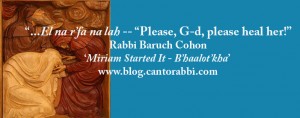MIRIAM STARTED IT – B’haalot’kha – Num. 12—by Rabbi Baruch Cohon
First it was Miriam, then Aaron who spoke against their brother Moses, as the Torah tells us, “because of the Cushite wife he took.” And so opens a singular story of family friction, dismal punishment and recovery.
The word “Cushite” challenges the commentators. “Cush” is the Hebrew name of Ethiopia. Was this a new wife? A new black wife? Was Miriam racially prejudiced? No, says Ibn Ezra. In all his 120 years Moses only took one wife, namely Zipporah, daughter of Jethro the priest of Midian. And Ethiopia is many miles from Midian. So the Midianites are not Africans. But they are tent-dwellers in a hot country, and ”have no whiteness at all” but are tanned very dark. So what does Cushite mean? Both Rashi and the Midrash insist that Cushite refers to Zipporah’s beauty. One proof cited is from gimatria – which does not mean Geometry, it means Numerology. Every Hebrew letter is also a number, and the sum total of the letter-numbers in cusheet = 736, identical to the sum total of the letters in the words y’fat mareh – “beautiful appearance.”
Another proof states that everyone acknowledged Zipporah’s beauty just as they acknowledge that an Ethiopian is black. It was obvious. Not only did she have good looks; she also behaved beautifully. So what is Miriam’s beef?
Rashi says Miriam objected, not to Moses’ marrying Zipporah but to his sending her away. Just a few sentences earlier we read about two men named Eldad and Meydad “prophesying in the camp.” When this report came out, Miriam was with her sister-in-law, and heard Zipporah say: “Alas for the wives of these men. If they are moved to prophecy, they will separate from their wives the way my husband separated from me.”
Judging from this insight, Moses and his marriage experienced the familiar pattern of a man’s calling, his work, damaging or even destroying his family life. And Miriam’s action qualifies her as an ancient feminist. Indeed we have no record of Miriam herself ever marrying or raising a family. Her devotion to her birth-family is total. She guards the basket where her baby brother floats in the Nile. She convinces the Egyptian princess to let her take him to a Hebrew wetnurse – their mother. Later she is described as a prophetess at the Red Sea, leading the women in sacred song and dance. In her merit a well is said to accompany the Israelites on their desert trek. And now, when Miriam badmouths her brother Moses, she is struck with leprosy! A leper in Hebrew is m’tzora – which the rabbis parse as an abbreviation for motzi shem ra – “bringing out a bad name”, in other words slander. In Miriam’s case the punishment is physical and requires her to stay outside the camp for a week. It is brother Aaron who appeals to the leader Moses, who in his deep humility offers the most compact prayer – just five short words – for her recovery: El na r’fa na lah — “Please, G-d, please heal her!” And in respect for Miriam, the camp does not move until she is healed and returns.
No wonder that the strength and talent and devotion that characterized Miriam made hers a favorite name that Jews give their daughters all through history.




This Parsha is so like many families today, unfortunately, it is sad but true.
It is so strange and sad that there is nothing written about Miriam’s private life.
She just dedicated herself to Adonoi and to Moses. She was a very devoted sister to Moses.
By the way, my Hebrew name is Miriam Rivka. I was named for my maternal grandmother and my maternal great grandmother.
Shavua tov.